- Home
- V. S. Naipaul
Guerrillas
Guerrillas Read online
ALSO BY V. S. NAIPAUL
NONFICTION
A Turn in the South
Finding the Center
Among the Believers
The Return of Eva Peron with The Killings in Trinidad
India: A Wounded Civilization
The Overcrowded Barracoon
The Loss of El Dorado
An Area of Darkness
The Middle Passage
FICTION
The Enigma of Arrival
A Bend in the River
Guerrillas
In a Free State
A Flag on the Island
The Mimic Men
Mr. Stone and the Knights Companion
A House for Mr. Biswas
Miguel Street*
The Suffrage of Elvira*
The Mystic Masseur*
* Published in an omnibus edition entitled Three Novels
FIRST VINTAGE INTERNATIONAL EDITION, SEPTEMBER 1990
Copyright © 1975 by V. S. Naipaul
All rights reserved under International and Pan-American Copyright Conventions. Published in the United States by Vintage Books, a division of Random House, Inc., New York. Originally published in Great Britain by Andre Deutsch Ltd., London, and in the United States by Alfred A. Knopf, Inc., in 1975.
Library of Congress Cataloging-in-Publication Data
Naipaul, V.S. (Vidiadhar Surajprasad), 1932—
Guerillas / V.S. Naipaul.—1st Vintage international ed.
p. cm.—(Vintage international)
eISBN: 978-0-307-78931-0
I. Title.
[PR9272.9.N32G8 1990]
823’.914—dc20 90-50147
v3.1
P.A.N.
“When everybody wants to fight
there’s nothing to fight for.
Everybody wants to fight his own little war,
everybody is a guerrilla.”
—JAMES AHMED
Contents
Cover
Other Books by This Author
Title Page
Copyright
Dedication
Epigraph
Chapter 1
Chapter 2
Chapter 3
Chapter 4
Chapter 5
Chapter 6
Chapter 7
Chapter 8
Chapter 9
Chapter 10
Chapter 11
Chapter 12
Chapter 13
Chapter 14
Chapter 15
Chapter 16
About the Author
AFTER LUNCH Jane and Roche left their house on the Ridge to drive to Thrushcross Grange. They drove down to the hot city at the foot of the hills, and then across the city to the sea road, through thoroughfares daubed with slogans: Basic Black, Don’t Vote, Birth Control Is a Plot Against the Negro Race.
The sea smelled of swamp; it barely rippled, had glitter rather than color; and the heat seemed trapped below the pink haze of bauxite dust from the bauxite loading station. After the market, where refrigerated trailers were unloading; after the rubbish dump burning in the remnant of mangrove swamp, with black carrion corbeaux squatting hunched on fence posts or hopping about on the ground; after the built-up hillsides; after the new housing estates, rows of unpainted boxes of concrete and corrugated iron already returning to the shantytowns that had been knocked down for this development; after the naked children playing in the red dust of the straight new avenues, the clothes hanging like rags from back yard lines; after this, the land cleared a little. And it was possible to see over what the city had spread: on one side, the swamp, drying out to a great plain; on the other side, a chain of hills, rising directly from the plain.
The openness didn’t last for long. Villages had become suburbs. Sometimes the side wall of a concrete house was painted over with an advertisement. In the fields that had survived there were billboards. And soon there was a factory area. It was here that the signs for Thrushcross Grange began: the name, the distance in miles, a clenched fist emblematically rendered, the slogan For the Land and the Revolution, and in a strip at the bottom the name of the firm that had put the sign up. The signs were all new. The local bottlers of Coca-Cola had put one up; so had Amal (the American bauxite company), a number of airlines, and many stores in the city.
Jane said, “Jimmy’s frightened a lot of people.”
Roche, slightly clownish with the cheap dark glasses he wore when driving, said, “Jimmy would like to hear you say that.”
“Thrushcross,” Jane said.
“Trush-cross. That’s how you pronounce it. It’s from Wuthering Heights. Like ‘furthering.’ ”
“I thought it sounded very English.”
“I don’t think it means anything. I don’t think Jimmy sees himself as Heathcliff or anything like that. He took a writing course, and it was one of the books he had to read. I think he just likes the name.”
The hills smoked, as they did now every day from early morning: thin lines of white smoke that became the color of dust and blended with the haze. Above the settlements lower down, which showed ocher, drought had browned the hills; and through this brown the bush fires had cut irregular dark red patches. The asphalt road was wet-black, distorted in the distance by heat waves. The grass verges had been blackened by fire, and in some places still burned. Sometimes, above the noise of the car, Jane and Roche could hear the crackle of flames which, in the bright light, they couldn’t see.
Traffic was heavy in this area of factories. But the land still showed its recent pastoral history. Here and there, among the big sheds and the modern buildings in unrendered concrete, the tall wire fences and the landscaped grounds, were still fields, remnants of the big estates, together with remnants of the estate villages: vegetable plots, old wooden houses on stilts, huts, bare front yards with zinnia clumps, ixora bushes, and hibiscus hedges. Grass now grew in the fields beside the highway; billboards offered building plots or factory sites. Sometimes there was a single rusting car in a sunken field, as though, having run off the road, it had simply been abandoned; sometimes there were heaps of junked vehicles.
Jane said, “I used to think that England was in a state of decay.”
Roche said, “Decayed from what?”
They left the factories behind. Traffic thinned; and when they turned off the highway they were at last in what seemed like country. But the bush had a cut-down appearance and looked derelict in the drought. Paved areas of concrete and asphalt could be seen; and sometimes there were rows of red brick pillars, hung with dried-out vines, that suggested antique excavations: the pillars might have supported the floor of a Roman bath. It was what remained of an industrial park, one of the failed projects of the earliest days of independence. Tax holidays had been offered to foreign investors; many had come for the holidays and had then moved on elsewhere.
Roche said, “I hope there’s something to see. But I doubt it.”
“You told him I was coming?”
“He was very much on the defensive when I told him. But I thought he was pleased. He made the usual excuses. The drought. But that’s Jimmy. Always hard done by.” Roche paused. “He’s not the only one.”
Jane said nothing.
Roche said, “He said that some of the boys had left. Run back to the city, I imagine. And I don’t think they like to feel that people are coming to spy on them.”
“You mean all they want is the publicity.”
Roche smiled. “It will do them no harm at all to be taken by surprise. It’s the only way, to corner them into doing what they say they want to do.”
The roads of the former industrial park were narrow and overgrown at the edges, and parts of the rough, graveled surface were eaten away. The land, part of the great plain, was
flat; but now the areas of low bush were fewer, and they lay between sections of secondary forest. There were still many roads; but one turning was like another, and it would have been easy for a stranger to get lost. Since they had left the highway there had been no signs for Thrushcross Grange. But then, abruptly in the wasteland, there was a new sign in yellow and red and black, with the emblematic clenched fist at the top.
THRUSHCROSS GRANGE
PEOPLE’S COMMUNE
FOR THE LAND AND THE REVOLUTION
Entry without prior permission strictly forbidden at all times
By Order of the High Command,
JAMES AHMED (Haji)
In a strip at the bottom, in letters cut out white on red, was the name of the local firm, Sablich’s, that had put the sign up.
Roche said, “We had to tone down Jimmy’s copy.” Roche worked for Sablich’s.
Jane said, “Haji?”
“As I understand it, a haji is a Muslim who’s made the pilgrimage to Mecca. Jimmy uses it to mean ‘mister’ or ‘esquire.’ When he remembers, that is.”
Not long after the board was a side road. They turned into that. A little way down there was a sentry box painted in diagonal stripes of black and red. It was empty; and the metal rail, also striped black and red, weighted at one end and intended as a barrier, was vertical. They drove on. The road was as narrow as the road they had turned off from, irregularly edged, the asphalt surface eaten into by crab grass and weeds from the wild verge. They drove through secondary bush and forest; there was as yet no sign of cultivation.
Jane said, “They have a lot of land.”
“That’s it,” Roche said. “Jimmy’s absurd in nearly every way. But he somehow gets things done. Sablich’s were thinking of buying it all up. Investment, I suppose. Then Jimmy stepped in, and they disgorged this bit. A twenty-five-year lease. A gift. Just like that.”
Roche laughed, and Jane saw his molars: widely spaced, black at the roots, the gum high: like a glimpse of the skull.
The road curved, and they saw a big cleared area, walled on three sides by forest, the forest walls seemingly knit together by the thin white trunks and white branches of softwood trees. The cleared land had been ridged and furrowed from end to end. The furrows were full of shiny green weeds; and the ridges, one or two of which showed haphazard, failed planting, were light brown and looked as dry as bone. Far from the road, against a forest wall, there was a low open shed, thatched with whole branches of carat palm. Near this, and half into the forest, was a red tractor: it looked as abandoned there as those rusting automobiles in the tall grass below the embankment of the highway. The field looked abandoned as well. But presently Jane saw three men, then a fourth, working at the far end, camouflaged against the forest.
Roche said, “That’s laid on for us. Or laid on for you. It’s their official rest period now. No one works in the fields at this time of the afternoon.”
After the cleared area there was forest again, threaded with the thin white branches of softwood trees and pillared with forest palms, their straight trunks bristling with black needles, hung with dead spiky fronds, and with clusters of yellow nuts breaking out of gray-green husks the shape of boats. Then the forest opened out again into clearings on both sides of the road. On one side the forest had been cut down to stumps and low bush. On the other side of the road the land was bare and clean, stripped of trees and palms and bush, the earth in places scraped down to pale red clay. At some distance from the road, on this side, on a smooth brown slope, there was a long hut with concrete-block walls and a pitched roof of corrugated iron. It stood alone in the emptiness. The roof was dazzling and hot to look at; it barely projected over the wall and cast no shadow.
The car stopped and there was silence. Even when the car doors slammed no one came out of the hut. There was no wind; the forest wall, dead green, was still; the asphalt road was soft below the gravel. Jane and Roche crossed the dry ditch by the bridge of three logs lashed together. The stripped land baked. Jane wanted shade; and the only shade lay within the dark, almost black, doorway of the long hut.
She walked ahead of Roche, as though, as always, she knew the way. He had paused to look about him. When he saw Jane walking up the slight slope to the hut door he felt, as he had feared, that her presence there was wrong and looked like an intrusion. The flowered blouse, through which her brassiere could be seen, the tight trousers that modeled stomach, groin, and cleft in a single, sudden curve: that could pass in the city, and in the shopping plaza of the Ridge would be hardly noticeable, but here it seemed provocative, overcasual enough to be dressy: London, foreign, wrong. And again it occurred to Roche that she was very white, with a color that wasn’t at all like the color of local white people. She was white enough to be unreadable; even her age might not be guessed. He walked quickly toward her, protectively. A fawn-colored pariah dog, ribby and sharp-faced, came round from the back of the hut and stood and watched, without expectation.
At first it seemed cool in the hut; and, after the glare outside, it seemed dark. They saw, as they entered, stepping up directly from clay to concrete floor, a steel filing cabinet in an unswept corner, an old kitchen chair, and a dusty table with what looked like a junked typewriter, a junked duplicator, and some metal trays. Then, as their eyes became accustomed to the interior light, they saw two rows of metal beds all the way down the concrete floor of the hut. Not all the beds were made up; some had mattresses alone, thin, with striped ticking. Clothes hung on nails above the beds that were in use: colored shirts of shiny synthetic material, jerseys, the jeans that looked so aggressive on, so shoddy off.
Four or five of the beds were occupied. The boys or young men who lay on them looked at Jane and Roche and then looked up at the corrugated iron or at the opposite wall. Their shiny black faces were blank; they did nothing to acknowledge the presence of strangers in the hut.
Roche said, “Mannie.”
The boy spoken to said without moving, “Mr. Ahmed bathing.”
Roche laughed. “Bathing? Jimmy’s been working with you?”
Mannie didn’t reply.
Jane could feel the grit on the concrete floor through the soles of her shoes; it set her teeth on edge.
Roche said to Jane, and it was as if he were speaking to the boys, “They built everything themselves.” He took off his dark glasses and looked less of a clown; he looked more withdrawn than his voice or manner suggested. He sucked at the end of one temple of the glasses. “Mannie, you were the mason, weren’t you?”
Mannie sat up and let his feet hang over the bed. He was small and slender. Beside his bed, on a gunny sack on the floor, there were about a dozen green tomatoes.
The hut that had at first felt cool now felt less so; Jane was aware that the corrugated iron was radiating heat. And the hut was more open than she had thought, was really full of light. Oblong windows, fitted with frosted-glass louvers in aluminum frames, were spaced out at the top of the wall that faced the road. Everything was exposed, lit up, and open for inspection: the boys, their faces, their clothes, the narrow beds, the floor below the beds.
On the wall next to the filing cabinet what had looked like a large chart could now be read as a timetable. Jane was considering it—ablutions, tea, field duties, barrack duties, field duties, breakfast, rest, barrack duties, dinner, discussion—when she heard Roche say “Jimmy,” and she looked and saw a man in the doorway at the far end of the hut.
The man was at first in silhouette against the white light outside. When he came into the hut he could be seen to be naked from the waist up, with a towel over one shoulder. As he came down the wide aisle between the metal beds, moving with short, light steps, he gave an increasing impression of physical neatness. The neatness was suggested by the slenderness of his waist, the width of his shoulders, by the closed expression of his face, by his full, closely shaved cheeks, by his trimmed mustache, and by his trousers, which were of a smooth, fawn-colored material, and tight, so that he seemed smooth an
d tight from waist to shoes. The shoes themselves were thin-soled, pointed, and shining below a powdering of red dust.
Jane had been expecting someone more physically awkward and more Negroid, someone at least as black as the boys. She saw someone who, close up, looked distinctly Chinese. The heavy mustache masked the shape of his top lip and stressed the jut rather than the fullness of his lower lip. His eyes were small, black, and blank; that, and the mustache, which suggested a mouth clamped shut, made him seem buttoned up, tense, unreadable.
To Roche he said, “Massa.” He nodded to Jane without seeming to see her. Not hurrying, indifferent to the silence, he took the green towel from his shoulder and put it on the back of the kitchen chair, and took a gray-blue-green tunic from a nail on the wall. The drab color killed the contrast between his face and his paler chest and made him less disturbing. Dressed at last, he pulled at the table drawer and said, “Yes, massa. As you see, we’re still holding out.”
Jane said, “I see you have a duplicating machine.”
“Secondhand from Sablich’s,” Jimmy said. “More like last hand.”
Roche said, “It would be a help if you learned to use it.”
“Yes, massa.” He took out some duplicated sheets from the drawer and gave them to Jane. “This will fill you in on background.”
The top sheet was dog-eared and felt dusty. Jane read: Communiqué No. 1. CLASSIFIED.
Roche said, “That’s the fairy story. I see the tractor’s still out of action, Jimmy. Didn’t Donaldson come?”
“Hmm. Is that what they told you at Sablich’s?”
“Didn’t he come?”
“Yes, massa. Donaldson came.”
Roche let the subject drop. He said, “All right. Let’s go and see what you’ve been doing about the septic tank.”
The two men went out into the sunlight. Jane stayed behind. She felt the eyes of the boys on her now, and she looked at the duplicated sheets in her hand.
All revolutions begin with the land. Men are born on the earth, every man has his one spot, it is his birthright, and men must claim their portion of the earth in brotherhood and harmony. In this spirit we came an intrepid band to virgin forest, it is the life style and philosophy of Thrushcross Grange.

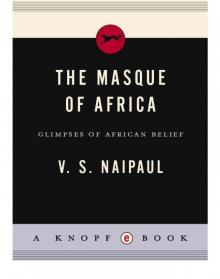 The Masque of Africa: Glimpses of African Belief
The Masque of Africa: Glimpses of African Belief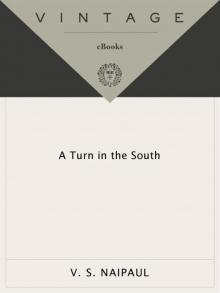 A Turn in the South
A Turn in the South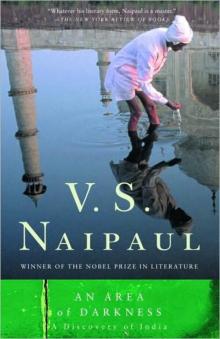 An Area of Darkness
An Area of Darkness Literary Occasions: Essays
Literary Occasions: Essays A Way in the World
A Way in the World Among the Believers: An Islamic Journey
Among the Believers: An Islamic Journey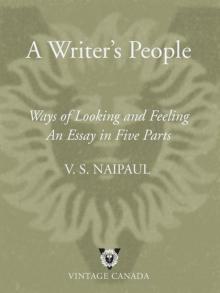 A Writer's People: Ways of Looking and Feeling
A Writer's People: Ways of Looking and Feeling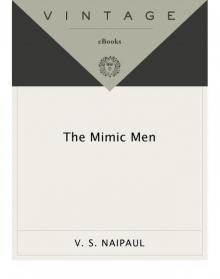 The Mimic Men: A Novel
The Mimic Men: A Novel Collected Short Fiction
Collected Short Fiction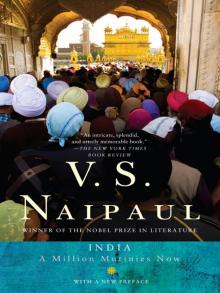 India: A Million Mutinies Now
India: A Million Mutinies Now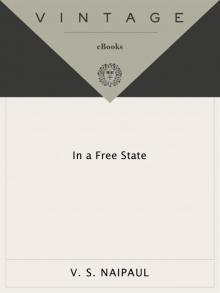 In a Free State
In a Free State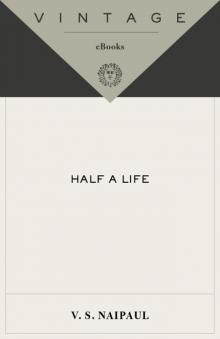 Half a Life
Half a Life Beyond Belief: Islamic Excursions Among the Converted Peoples
Beyond Belief: Islamic Excursions Among the Converted Peoples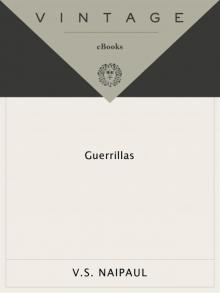 Guerrillas
Guerrillas A House for Mr. Biswas
A House for Mr. Biswas The Writer and the World: Essays
The Writer and the World: Essays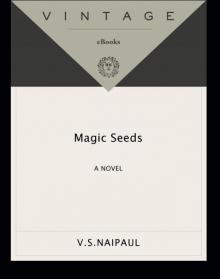 Magic Seeds
Magic Seeds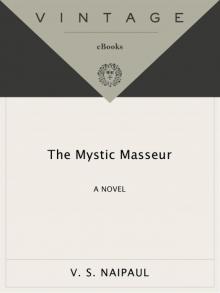 The Mystic Masseur
The Mystic Masseur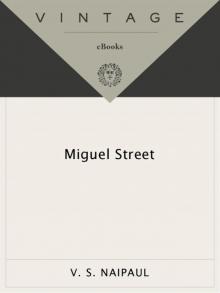 Miguel Street
Miguel Street The Return of Eva Perón, With the Killings in Trinidad
The Return of Eva Perón, With the Killings in Trinidad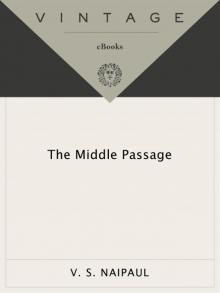 The Middle Passage
The Middle Passage A Bend in the River
A Bend in the River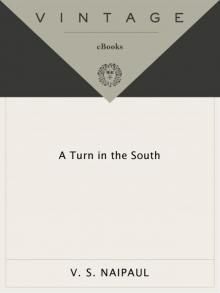 A Turn in the South (Vintage International)
A Turn in the South (Vintage International) Among the Believers
Among the Believers Literary Occasions
Literary Occasions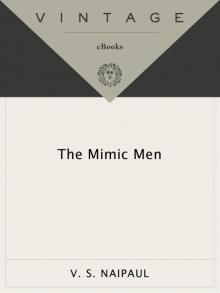 The Mimic Men
The Mimic Men The Writer and the World
The Writer and the World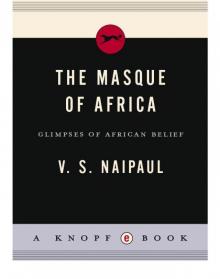 The Masque of Africa
The Masque of Africa